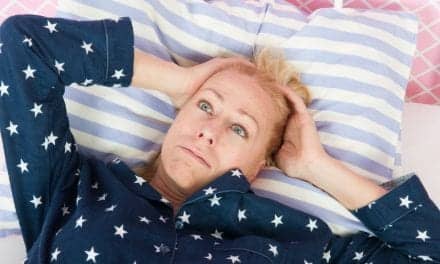A pilot study of narcolepsy patients finds a meditation-relaxation therapy had a ‘massive’ impact on episodes of sleep paralysis.
Interview by Sree Roy
People who have experienced sleep paralysis may recall with terror the feeling of being conscious but unable to move. Neuropsychiatrist Baland S. Jalal, PhD, has experienced sleep paralysis firsthand—and his episodes inspired him to create a therapy to alleviate these potentially scary transitions between sleep and wake.
Jalal conducted a pilot study on 10 patients with narcolepsy—a neurological sleep disorder in which sleep paralysis is a known symptom—to find out if a meditation-relaxation therapy would be efficacious for decreasing their paralysis. The therapy consists of 4 steps: 1) reappraisal of the meaning of the sleep paralysis; 2) psychological and emotional distancing; 3) inward focused-attention meditation; and 4) muscle relaxation.
The study found a 50% reduction in the number of days that sleep paralysis occurred and a 54% reduction in the total number of episodes in the study’s second month.
“This pilot, although preliminary, is a step in the right direction,” says Jalal, who is a visiting researcher at Cambridge University’s Department of Psychiatry and a researcher at Harvard University’s Department of Psychology.
Jalal discussed the study with Sleep Review (SR) over email. The transcript has been lightly edited for clarity and style.
SR: How did you determine which participants to put in each group (intervention versus active control)?
BSJ: Participants were assigned to the two conditions based on convenience (that is, in a non-randomized way); eg, participants were not assigned to each group based on their clinical severity, which would have been ideal.
SR: In the pilot study, why do you think the intervention worked?
BSJ: The treatment may have reduced some of the panic and fear associated with sleep paralysis and the terrifying hallucinations—giving them a tool to help cope with these experiences.
SR: What surprised you?
BSJ: The massive (50% plus) reduction in sleep paralysis episodes by the end of the treatment was surprising. But this is a small pilot study so we are cautiously optimistic and more research is needed.
SR: What are the clinical implications?
BSJ: If these findings are replicated in larger studies—also relying on people without narcolepsy—then this may lead to a simple and easy-to-apply treatment for many sleep paralysis sufferers.
SR: What type of practitioner do you see as teaching this therapy to patients?
BSJ: Psychologists and psychiatrists could help administer this treatment. But importantly it may be possible to have patients use such a treatment if delivered via a smartphone directly—given its relative simplicity and noninvasive nature—without clinical supervision. This would be most ideal as it could easily reach many sufferers. Research should explore this further.
SR: Depression and anxiety disorders are some of narcolepsy’s more common comorbidities. What are your thoughts on whether sleep paralysis is driving these comorbidities?
BSJ: It is unclear and perhaps unlikely that sleep paralysis is fully responsible for depression and anxiety in narcolepsy. But regular sleep paralysis, if terrifying, would probably worsen these symptoms. It is likely that by targeting sleep paralysis we could also improve depression and anxiety.
[RELATED: Sleep Paralysis in Narcolepsy: 4 Steps Help Ease the Experience]
SR: What is the difference in isolated sleep paralysis and sleep paralysis in people with narcolepsy?
BSJ: Sleep paralysis in narcolepsy occurs due to organic brain factors (deficiencies in certain proteins). But it appears the experience of sleep paralysis itself is similar in the two populations. But more research is needed on this topic.
SR: What further research should be done?
BSJ: Research should explore the effectiveness of meditation-relaxation therapy, for example using smartphone technology in people with and without narcolepsy.
The Study
Jalal B, Moruzzi L, Zangrandi A, et al. Meditation-relaxation (MR Therapy) for sleep paralysis: a pilot study in patients with narcolepsy. Front Neurol. 2020 Aug 12;11:922.
Illustration 168227329 © Jemastock – Dreamstime.com
Sleep researchers interested in participating in a Q&A should email editor[at]sleepreviewmag.com with a link to their relevant study.




![“Ode to Joy”: A Rom-Com Featuring Cataplexy [Trailer]](https://sleepreviewmag.com/wp-content/themes/Extra/images/post-format-thumb-text.svg)
